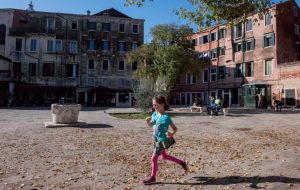VENICE AND THE GHETTO The University and the Jewish Community, an Endless History
When the Ghetto of Venice was dissolved, a huge amount of intellectual energy was released from that small place, to the benefit of the whole city. Venetian Jewish people were eager to exercise the rights that they had just conquered and wanted to contribute to the creation of a unified Italy; they also left their mark inside the University, which had been created in 1868 as the first Business School in Italy and the second in Europe. Among its founders there is the great economist Luigi Luzzatti, who will later become Prime Minister.
Ca’ Foscari, as the Athenaeum is named nowadays, eventually had two Jewish chancellors, the writer Enrico Castelnuovo, from 1905 to 1914, and the economist Gino Luzzatto, who arrived in Venice in 1922 as the first Italian professor of Economic History at the “Royal School of Economic and Social Sciences”, and later became its director. He was discharged in 1938, because of the Racial Laws, but came back as Chancellor from 1945 to 1953.
Ca’ Foscari is also a place in which Jewish students can grow in many fields: the teaching of Hebrew has been a cornerstone at the Faculty of Oriental Languages since 1950, when rabbi Elio Toaff started teaching it. This tradition goes on, enriched by new courses, researches and prestigious partnerships with the University of Tel Aviv and the Hebrew University of Jerusalem. The University has actively subscribed to the program of the five hundredth anniversary of the foundation of the Venetian Ghetto and, in order to highlight the incredible “journey” that has transformed the word “ghetto” into a universal category, two conferences have been organized; they are part of an interesting program, which has been created with the collaboration of local and international institutions.
On March 1st and 2nd, “The Ghetto reconsidered: Minority and Ethnic Quarters in Texts and Images”, by Emanuala Trevisan Semi, compared the amount of minority quarters with the Jewish ones, while the symposium “The Ghetto as Global Metaphor” will be held in July, with the participation of well-known writers and sociologists who will analyze the transformation of the Venetian Ghetto into a transnational metaphor.
The literature festival “Incroci di Civiltà” will host special sessions related to the Ghetto, with original works by Arnold Zable and Doron Rabinovici. The most ambitious project of Ca’ Foscari program will be the production of Shakespeare’s “The Merchant of Venice” in Campo del Ghetto, the perfect setting for this play, whose main character is the Jew named Shylock. This project, coordinated by Ca’ Foscari professors Shaul Bassi and Maria Ida Biggi, arose from the collaboration among the greatest scholars of this play (James Shapiro, Stanley Wells, Stephen Greenblatt) and the Italian-American acting company Colombari. Its purpose is to fearlessly face this controversial play without underestimating its ambivalence; undoubtedly, “The Merchant of Venice” and Shylock have been used as a vehicle of anti-Semitism in certain periods of history but, at the same time, Shylock himself has produced empathy towards the oppressed minority. Bringing the play into the campo in which Venetian Jewish people have lived for centuries is a huge responsibility, but Ca’ Foscari fully accepts it, and the uninterrupted exchange with the Jewish community guarantees the total respect for this location and its traditions.
The last important event related to the play proves that this is an opportunity to reflect: Shylock and Antonio’s process will be acted by real lawyers and chaired by an important personality of the international legal world, the US Supreme Court Justice Ruth Bader Ginsburg. This way the University contributes to enhance the multiple acceptations of the Venetian Ghetto.
*Michele Bugliesi is the rector of the Università Ca’ Foscari in Venice. This article has been translated by Ilaria Modena, student at the Scuola superiore interpreti e traduttori di Trieste, who is doing her apprenticeship in the newsroom of Pagine Ebraiche.

